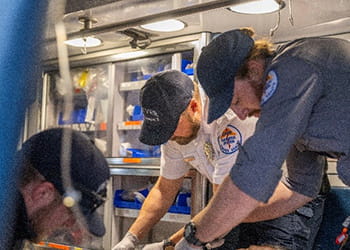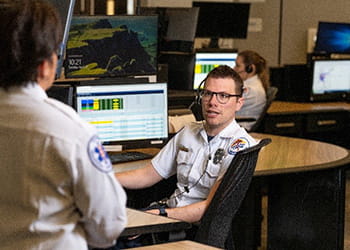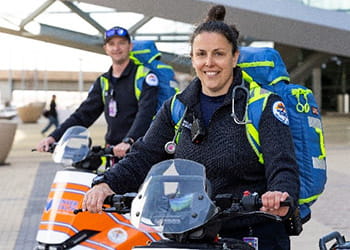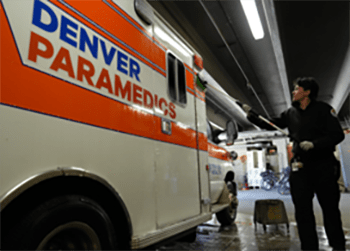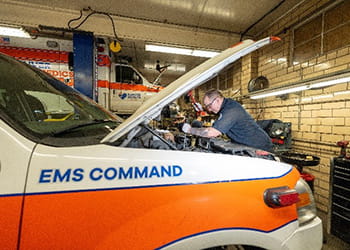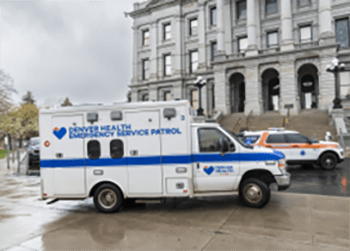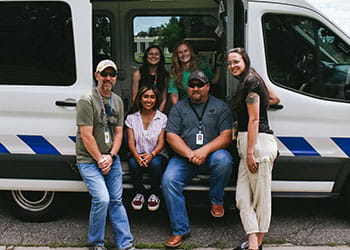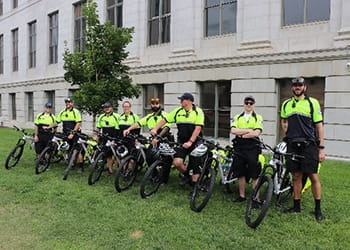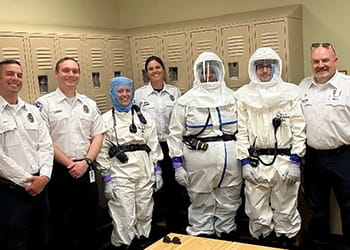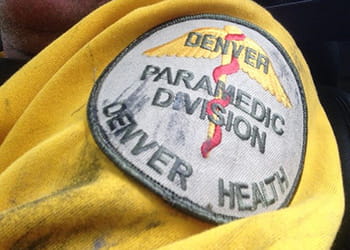Street Operations
Denver Health Paramedic Division (DHPD) provides 911 Advanced Life Support (ALS) Emergency Medical Services (EMS) and ambulance transportation to the City and County of Denver, Denver International Airport, as well as the cities of Glendale, Sheridan, Englewood, and areas of unincorporated Arapahoe County.
The Denver Health Paramedic Division consists of:
- 269 front line paramedics and emergency medical technicians (EMT)
- 41 command staff
- Nearly 100 employees in communications, education, vehicle, and administration support.
Paramedic Dispatchers
The dispatch center for the Denver Paramedics is housed in the Denver 911 Communications Center, an ACE accredited Center of Excellence through the International Academies of Emergency Dispatch (IAED). All of the EMS dispatchers are certified in the use of the Emergency Medical Dispatch (EMD) system that allows our dispatchers to quickly determine what EMS resources will be sent to each 911 call and aids dispatchers in providing crucial instructions to callers to help them manage the situation until crews arrive. The Denver EMS dispatch center is responsible for coordinating the deployment of Denver Health ambulances and emergency service patrols and is also an important resource for communicating with mutual aid partners during disasters. EMS dispatch is staffed 24-hours a day. The team includes 29 full-time and intermittent dispatchers as well as five lieutenants and a captain. The structure within the 911 Communications Center encourages seamless transfer of information between the city’s emergency response partners including the Denver Fire Department and the Denver Police Department.
Denver International Airport
Denver Paramedics provide EMS for the entire City and County of Denver which includes Denver International Airport (DEN). The DEN coverage includes paramedics stationed in the Jeppesen Terminal as well as throughout the concourses. We have a chief, three lieutenants, and a group of 75 paramedics trained to staff the airport, with 11 working 10-hour shifts staggered throughout the day and night to provide optimal 24/7 coverage. We also have two dedicated ambulances on-site for transport to hospitals. Paramedics respond to calls for anyone who may be at the airport including passengers, families and airport personnel.
Vehicle Support Technicians
Vehicle Support Technicians (VST) work in a team environment to ensure all equipment and vehicles are properly stocked, stored and maintained. Primary duties include, but are not limited to: stocking equipment, maintaining ambulances, bagging supplies, cleaning/sanitizing equipment, and scheduling vehicles for service. Secondary duties may include: basic garage maintenance, assisting EMT’s and paramedics going into service and driving vehicles non-emergent to and from various sites as needed.
Paramedics Fleet Operations
The Denver Health Paramedics Fleet Operations team is responsible for maintaining and repairing 39 Denver Health ambulances, 20 command vehicles, 8 STAR Vans, 5 CARES Vans and 63 other assorted vehicles for the Hospital including mobile health units, shuttles and more. The team builds, modifies and fabricates vehicles and parts. They are responsible for installing emergency lighting, sirens and two-way radio communication systems in all emergency vehicles.
- Build, Modify, and Fabricate Vehicles for Hospital use.
- Install emergency lighting, sirens, and two-way radio communication systems.
- Doing maintenance/repairs for Denver Health Ambulance for 30 Years before they bought the Shop in 2016.
Emergency Service Patrol
Denver Health’s Paramedic Division operates an Emergency Service Patrol (ESP) which safely transports individuals with substance intoxication throughout the city of Denver directly to Denver CARES. ESP responds to police requests, community calls, and Denver Health Emergency Department requests. ESP responds to more than 10,000 calls annually.
Support Team Assisted Response (STAR)
The Support Team Assisted Response (STAR) Program is an alternative response model operating within the City and County of Denver. STAR pairs a WellPower mental health clinician with a Denver Health paramedic or EMT. The team is dispatched through Denver 911 Communications and responds to low risk, low acuity crisis calls that arise from public health and mental health needs in the community. The team can provide medical assessment/triage, crisis intervention, de-escalation, transportation, and resource connection for community members in need. The goal of the STAR Program is to send the right resources to community members when they are in crisis.
STAR is managed by the Denver Department of Public Health & Environment in partnership with the Denver Department of Safety. The STAR Community Coalition is managed by Servicio’s de la Raza and works to provide follow up mental/social health care and connection to long term services, through referrals from the STAR van team. Community collaboration was instrumental in the design and ongoing accountability for this program.
DHPD Bike Team
The Denver Health Paramedic Division Bike Team provides rapid-access pre-hospital Advanced Life Support services at complex mass gathering and crowded pedestrian events around the City and County of Denver. Historically, this has included, but is not limited to: sporting events, concerts, parades, races, rallies and other community events. Our bike team has also been the exclusive EMS provider of the Colorado Rockies since Coors Field opened in 1995 As part of eligibility for the team, our paramedics participate and complete 32 hours of International Police Mountain Bike Association (IPMBA) certification, which includes both classroom and riding skills.
HIT Team
The Highly Infectious Transport (HIT) Team within the Denver Health Paramedics is a team of specially trained paramedics whose mission is preparing for and responding to high-risk special pathogens in the prehospital setting within HHS Region VIII (includes Colorado, Utah, Wyoming, Montana, South Dakota and North Dakota). In a partnership with the Denver Health Biocontainment Unit our team participates in regular trainings, drills, and exercises not only within our region, but also nationally.
Wildland Fire Support
The Denver Health Paramedic Division launched its one-of-a-kind Wildland Fire Team in 2013. The 20-person team includes paramedics and command staff to support all operational needs. This team is expertly trained on providing high-level emergency response to people affected by wildland fires and providing medical care for the firefighters working on the fire grounds. Everyone on the team meets the national standards of being a wildland firefighter and can work directly on the fireline as a paramedic. Paramedics who are interested in being a part of the Wildland Team are subject to an extensive screening process and physical tryouts. Those who pass spend a considerable amount of time training with the current team to learn the basics of wildfire line management and basic firefighting skills. They also take specialty training on providing long-term medical care in the backcountry. The team has been deployed to eleven states including Washington, Alaska, Texas, and Montana, supporting multiple agencies across the nation.



